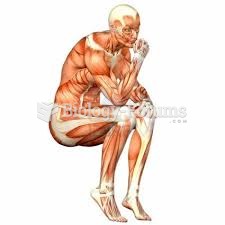|
|
|
The first oncogene was discovered in 1970 and was termed SRC (pronounced "SARK").
Drugs are in development that may cure asthma and hay fever once and for all. They target leukotrienes, which are known to cause tightening of the air passages in the lungs and increase mucus productions in nasal passages.
The human body's pharmacokinetics are quite varied. Our hair holds onto drugs longer than our urine, blood, or saliva. For example, alcohol can be detected in the hair for up to 90 days after it was consumed. The same is true for marijuana, cocaine, ecstasy, heroin, methamphetamine, and nicotine.
The average office desk has 400 times more bacteria on it than a toilet.
Multiple experimental evidences have confirmed that at the molecular level, cancer is caused by lesions in cellular DNA.







